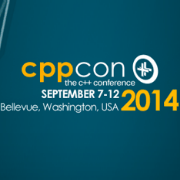 The CppCon 2014 conference program has been posted for the upcoming September conference. We've received requests that the program continue to be posted in "bite-sized" posts, a few sessions at a time, to make the 100+ sessions easier to absorb, so here is another set of talks. This series of posts will conclude once the entire conference program has been posted in this way.
The CppCon 2014 conference program has been posted for the upcoming September conference. We've received requests that the program continue to be posted in "bite-sized" posts, a few sessions at a time, to make the 100+ sessions easier to absorb, so here is another set of talks. This series of posts will conclude once the entire conference program has been posted in this way.
In addition to other performance-focused CppCon talks posted yesterday, CppCon 2014 also has thorough coverage of a very specific form of high performance parallel code -- using GPUs for general-purpose computation (aka GPGPU). This is important because every desktop machine and notebook, and nearly every tablet and smartphone, contains not only multiple CPU cores and vector units, but also a "compute-class" GPU -- these three forms of hardware parallelism are part of the mainstream hardware platform for the foreseeable future in all form factors. If you have a computationally intensive app or an app that could benefit from faster local processing, and you're not exploiting the GPU, you're leaving performance (and battery life) on the table and should be sure to attend these sessions.
In this post:
- Writing Data Parallel Algorithms on GPUs
- Another fundamental shift in Parallelism Paradigm? OpenMP 4.0 for GPU/Accelerators and other things
- Introduction to C++ AMP (GPGPU Computing)
Writing Data Parallel Algorithms on GPUs
Today most PCs, tablets and phones support multi-core processors and most programmers have some familiarity with writing (task) parallel code. Many of those same devices also have GPUs but writing code to run on a GPU is harder. Or is it?
Getting to grips with GPU programming is really about understanding things in a data parallel way. This talk will look at some of the common patterns for implementing algorithms on today's GPUs using examples from the C++ AMP Algorithms Library. Along the way it will cover some of the unique aspects of writing code for GPUs and contrast them with a more conventional code running on a CPU.
Speaker: Ade Miller. Ade Miller writes C++ for fun. He wrote his first N-body model in BASIC on an 8-bit microcomputer 30 years ago and never really looked back. Recently, he's written two books on parallel programming with C++; "C++ AMP: Accelerated Massive Parallelism with Microsoft Visual C++" and "Parallel Programming with Microsoft Visual C++". Ade spends the long winters in Washington contributing to the open source C++ AMP Algorithms Library and well as a few other projects. His summers are mostly spent crashing expensive bicycles into trees.
Another fundamental shift in Parallelism Paradigm? OpenMP 4.0 for GPU/Accelerators and other things
Another fundamental shift in Parallelism Paradigm? Sure. When was the last time you heard that before?
But seriously, as the number of threads/cores continue to increase, there is a growing pressure on applications to exploit more of the available parallelism in their codes, including coarse-, medium-, and fine-grain parallelism. OpenMP has been one of the dominant shared-memory programming models but is evolving beyond that with a new Mission Statement (no, really!) making it well suited for exploiting medium- and fine-grained parallelism.
OpenMP 4.0 exhibits many of these features to support the next step in both consumer, high-performance and exascale computing, with one of the world's first programming model for high-level language support for GPU/Accelerators and vector SIMD across not 1 but 3 high-level languages: C++, C, and that language whose name we dare not speak, but starts with F.
Speaker: Michael Wong, OpenMP CEO/Architect, IBM/OpenMP. Anything including C++, Transactional Memory, Parallel Programming, OpenMP, stars, tennis, travel, and the best food.
Introduction to C++ AMP (GPGPU Computing)
Meet C++ AMP (Accelerated Massive Parallelism), an abstraction layer on top of accelerators such as GPUs. In its current version it allows you to run code on any DX11 GPU, independent of the vendor, and it will even distribute workload across GPUs of different vendors simultaneously. C++ AMP was originally designed by Microsoft but is now an open standard. C++ AMP can deliver orders of magnitude performance increase with certain algorithms by utilizing the GPU to perform mathematical calculations. This talk will give a high level overview of what C++ AMP is and what it can do for you. It is time to start taking advantage of the computing power of GPUs!
Speaker: Marc Gregoire, Nikon Metrology. Marc Gregoire has worked as a software engineer consultant for 6 years for Siemens and Nokia Siemens Networks on critical 2G and 3G software running on Solaris for telecom operators. This required working in international teams stretching from South America and USA to EMEA and Asia. Now, Marc is working for Nikon Metrology on 3D scanning software. Marc is the author of "Professional C++, Second and Third Edition", published by Wiley/Wrox, is the founder of the Belgian C++ Users Group (www.becpp.org), and has written a number of articles which have been published on CodeGuru and/or his personal blog. He also creates freeware and shareware programs that are distributed through his website at www.nuonsoft.com, and maintains a blog on www.nuonsoft.com/blog/.

Add a Comment
Comments are closed.